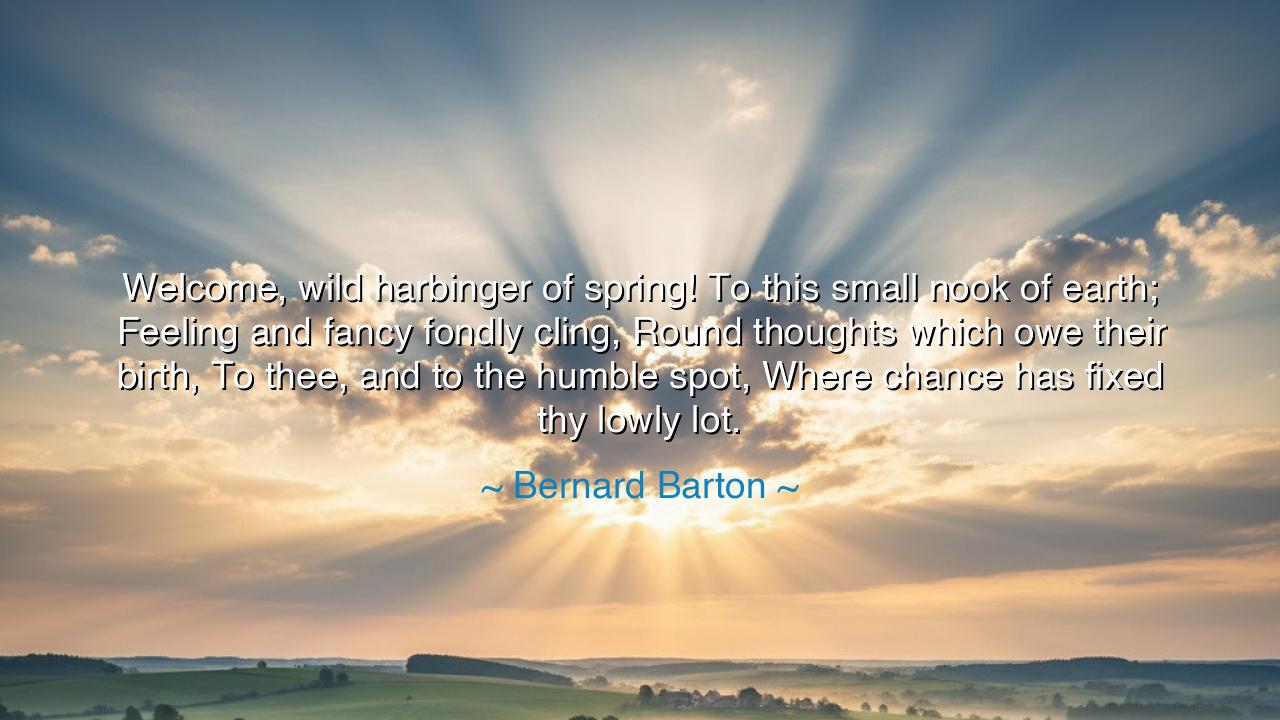
Welcome, wild harbinger of spring! To this small nook of earth;
Welcome, wild harbinger of spring! To this small nook of earth; Feeling and fancy fondly cling, Round thoughts which owe their birth, To thee, and to the humble spot, Where chance has fixed thy lowly lot.






"Welcome, wild harbinger of spring! To this small nook of earth; Feeling and fancy fondly cling, Round thoughts which owe their birth, To thee, and to the humble spot, Where chance has fixed thy lowly lot." These evocative words from Bernard Barton celebrate the arrival of spring, a season that has long been recognized as a symbol of renewal, hope, and transformation. In his poetic reflection, Barton not only welcomes the changing of seasons but also pays tribute to the small and often unnoticed corners of the world where the natural world unfolds in its quiet splendor. He speaks to the profound connection between nature and the human spirit, where the awakening of the earth stirs thoughts, feelings, and imagination, creating a deep bond between the observer and the world around them.
The ancients, in their wisdom, saw nature as a mirror of the human soul. In Greek mythology, Demeter, the goddess of the harvest, embodies the earth’s fertility and the cycle of the seasons. Her grief at the abduction of her daughter Persephone results in the winter months, while her joy upon Persephone's return heralds the rebirth of the earth in spring. This cyclical pattern reflects the deeply ingrained human understanding that life is not a linear progression but a series of cycles—birth, death, and rebirth—that shape the world and our lives. Just as Demeter’s sorrow and joy mark the changing of the seasons, so too do the changes in nature reflect the emotional and spiritual rhythms of the human heart.
Barton’s ode to spring speaks to the humble spot where the smallest of changes can have the greatest impact. In this small, seemingly insignificant place, the wild harbinger of spring arrives, symbolizing the potential for transformation that lies even in the most modest of circumstances. "Chance," as Barton calls it, may have determined this humble location, but it is in the quiet beauty of this place that the most profound thoughts are born. The arrival of spring, with its burst of life and color, awakens the imagination and stirs the heart, reminding us that even the smallest moments of beauty can bring about great change in our souls.
Consider the ancient Chinese philosophy of Taoism, which teaches that the smallest actions, the humblest movements, can change the course of nature and life. The Tao, or the way of the universe, is not a force that seeks grand gestures but flows through the subtle, the quiet, and the unseen. Just as a tiny stream may eventually carve out a canyon, so too does the quiet influence of nature shape the course of our lives. Barton’s praise for the humble spot where chance has fixed its course echoes this ancient wisdom, reminding us that no matter how small the moment, there is beauty and potential in the quiet unfolding of life.
The arrival of spring serves as a reminder that no matter how difficult or cold the seasons of life may be, there is always a time for rebirth and renewal. The cycle of nature, as Barton celebrates, teaches us that every hardship, every moment of winter in our lives, holds within it the seed of something new, something full of potential and life. The poet’s words remind us to look to the smallest, humblest things—like the first buds on a tree or the softening earth beneath our feet—and recognize that from these, new thoughts, new opportunities, and new dreams are born. Spring, though small in its beginnings, promises the fullness of life, and we must not underestimate the quiet power of this transformation.
In our own lives, there is much we can learn from Barton’s celebration of the humble and the small. In a world that often prizes grandeur and immediate results, we must not forget the quiet power of small moments—the simple acts of kindness, the overlooked moments of beauty, and the gentle unfolding of change. These moments, like the quiet arrival of spring, may seem small at first, but they are the harbingers of something greater. Patience, reflection, and the ability to see the potential for growth in every moment are the lessons that Barton imparts through his words.
The practical action we must take, then, is to embrace the quiet moments of our lives. Like the first signs of spring, we must recognize that even the smallest changes, the quietest thoughts, can have profound effects. By embracing these moments, we connect ourselves to the larger cycles of the world and the deep wisdom that nature offers us. Let us cultivate gratitude for the humble spots in our lives where transformation begins, and let us trust that even the most unassuming moments can lead to the most significant growth.
Thus, the lesson of Bernard Barton’s ode to spring is one of embracing the humble beginnings of transformation. It is a reminder that, just as the first signs of spring emerge from the smallest corners of the earth, so too can the seeds of our personal growth and renewal be found in the quietest moments of our lives. Let us celebrate these moments, let them awaken us to the potential of the present, and let us trust that from the smallest beginnings, great things can emerge.






AAdministratorAdministrator
Welcome, honored guests. Please leave a comment, we will respond soon